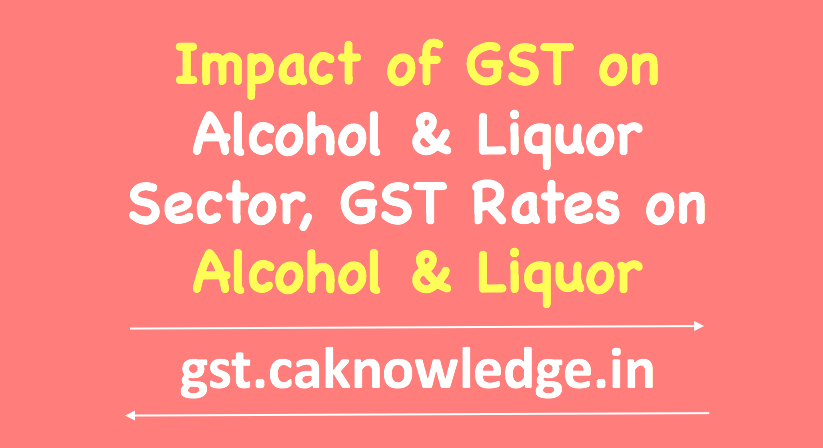Impact of GST on Alcohol & Liquor Sector, GST Rates on Alcohol & Liquor: Alcohol sector is the second largest contributor of taxes to state government in India. Manufacture of liquor meant for human consumption is subject to state excise duties and not central excise duty. However, state excise duties will get replaced in GST. Andhra Pradesh and Telangana are the highest alcohol consuming state in India. The population of these states is not only ahead in consuming Indian made foreign liquor (IMFL) but also gets high of country liquor…
Impact of GST on Alcohol & Liquor Sector
Indirect Impact
State government will continue to levy taxes on alcohol, but central government has kept portable alcohol and alcohol for human consumption, out of GST purview. Alcohol manufacturers are still claiming that they will see a hit on their margins due to increase tax rates in input goods and services.
Price Variations
Prices of whiskey and wine are likely to be increased by 3% – 5%, while for beers they may range between 12%-15%. Though liquor is exempted from GST, but major inputs required for producing saleable alcohol like glass bottles, molasses, barley malt and denatured alcohol will be taxed between 18%-28%. Hence manufacturers will end up paying taxes on input services and goods without obtaining any liability on sales. However, if the prices increases, the customers will decrease which might affect the states’ revenue in horizon.
Marginal Relief
Only sigh of relief is in relaxation of GST on second-hand liquor bottles. It is because, firm relies on second hand bottle as they have life span of seven time uses and cost only 33.33% of new bottle.
Product Portfolio
It is also expected that companies will see their margins in dip on their cheap brands that operate on lower margins than the mid-market and premium brands due to higher input taxes; this will get stabilized once cost is passed to the end consumer which may take 6 months period.
Policies Pressure
This industry has already taken a lot of hits due to demonetization and the highway ban. State government has also lost their ration of revenue collections. In that case if State Government does not come up with appropriate directions, then companies will have to and bound to shoot their prices
Expensive for end consumers
Manufacturers of alcoholic beverages for human consumption obtain the raw materials (Extra Neutral Alcohol (ENA)/Grain Neutral Spirit (GNS) / Concentrate of Alcoholic Beverage) either through captive manufacture or by way of purchase from third parties in India or they import it from other countries. As the finished product will be kept outside GST regime, it will not only have negative impact on the state revenues but also makes the end product expensive and thus, drive the consumers to find ways and means to resort to spurious products
Second-hand Bottle Boon
Some of the alcohol – beverages manufacturers use their own restricted patented bottles, which may be used 5-7 times by the same manufacturer. Presently, many States impose a lesser VAT rate with some states like imposing the standard VAT rate on glass bottles taxable against the VAT on the finished product sold within the state. The used glass bottles which are purchased by brewers / spirits manufacturers from used bottle dealers are again taxed at the lower/ standard VAT.
In GST, each re-use / re-supply is likely to attract GST @ 18% with no possibility of credit as alcohol is excluded from GST base. The effective GST cost on every bottle will come to around 70% of the purchase price of a new bottle. This too will increase the cost as levying VAT on used bottles at the full purchase price leads to dual taxation, since the bottles have already been exposed to VAT at the time of first purchase by the brewery or manufacturer from the bottle manufacturer.
GST rates on goods
| HSN Code | Description of Goods & Services | GST Rate |
| 2201 | Water [other than aerated, mineral, purified, distilled, medicinal, ionic, battery, de-mineralized and water sold in sealed container] | NIL |
| 2201 | Non-alcoholic Toddy, Neera | NIL |
| 2202 90 90 | Tender coconut water put up in unit container and bearing a registered brand name | NIL |
| 2201 90 10 | Ice and snow | 12% |
| 2201 90 10 | Soya milk drinks | 12% |
| 2202 90 30 | Fruit pulp or fruit juice based drinks | 12% |
| 2202 90 90 | Tender coconut water put up in unit container and bearing a registered brand name | 12% |
| 2202 90 30 | Beverages containing milk | 12% |
| 2201 | Waters, including natural or artificial mineral waters and aerated waters, not containing added sugar or other sweetening matter nor flavoured. | 18% |
| 2207 | Ethyl alcohol and other spirits, denatured, of any strength | 18% |
| 2209 | Vinegar and substitutes for vinegar obtained from acetic acid | 18% |
| 2202 90 90 | Other non-alcoholic beverages | 28% |
| 2202 10 | Aerated waters, containing added sugar or other sweetening matter or flavoured | 28% |
| Beer, wine, rum, brandy, whisky, vinegar etc. fall under HSN code chapter 22 of GST commodity tariff schedule. The details about GST rate changes on sale of Beer, wine, rum, brandy, whisky, vinegar etc. | 28% |
Key points:-
- Cascading effect of tax still remains.
- Multiplex of taxes.
- No input tax credit on GST paid on raw material.
- On encouragement for Foreign direct investment.
- Increase price of liquor.
- Blockage of input credit
- Increased production cost.
- Restaurants and bars serving alcohol and selling both GST and Non-GST products may be required to undertake dual compliance.
Written By: Amit Khiyani (CA, LCS, IFRS, BCom)
Contact: [email protected]
Recommended Articles
